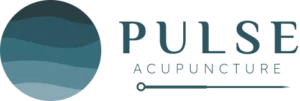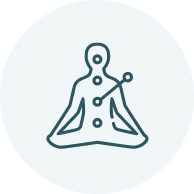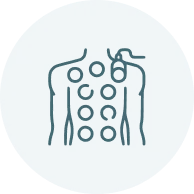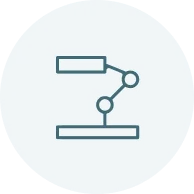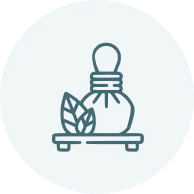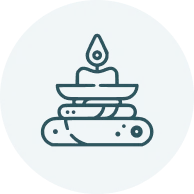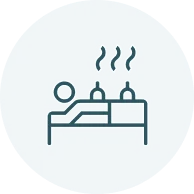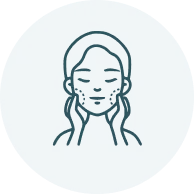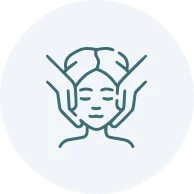Orthopedic and Sports Acupuncture in Clifton, NJ
Orthopedic and Sports Acupuncture in Clifton, NJ
Optimizing Performance and Recovery: Acupuncture for Orthopedics and Sports
What is Sports and Orthopedic Acupuncture?

Sports Medicine Acupuncture encompasses the development of tailored treatment plans, precision needling techniques, and the prescription of rehabilitative exercises, alongside various supportive therapies such as heat therapy, cupping, and Chinese Herbal Medicine.
Healthy organs foster the production of vital primary substances, essential for a robust musculoskeletal system. Factors contributing to the vitality of these substances include regular exercise, a nutritious diet, genetic factors, effective stress management, fulfilling work, a robust social and emotional support network, and a well-balanced mental, emotional, and spiritual life.
Features of Sports and Orthopedic Acupuncture at Pulse Acupuncture in Clifton, NJ
When treating recurring sports injuries in athletes with acupuncture, a thorough assessment is performed using palpation, muscle length tests, and range of motion evaluations to identify latent stagnation. This condition is marked by persistent pain points around the motor point, reduced range of motion, muscle imbalances, soft tissue adhesions, and a tendency for injury to recur.

TDP lamps
A common method of heat therapy is the use of far-infrared (FI) wavelength energy lamps. Far infrared is known to penetrate approximately 0.8 inches below the skin’s surface, offering advantages like improved white blood cell function, better delivery of oxygen and nutrients to soft tissues, and enhanced lymphatic circulation. Additionally, TDP therapy has been reported to be effective in treating conditions such as chronic wounds, joint pain, arthritis, and injuries related to back pain.
Myofascial Massage Techniques
In Sports Medicine Acupuncture, a range of massage techniques including tuina, active release, soft tissue release, and myofascial release are employed. These methods all focus on manipulating myofascial tissues to alleviate tension, dissolve fascial adhesions, enhance blood circulation, and aid in retraining neuromuscular receptors.

Importance of TCM Theory and Integration with Sports Medicine

Lungs in TCM Theory
- Rule Qi of the chest
- Rule Qi and control respiration
- Regulate Water Passages
- Govern the skin
- Circulate protective qi
Effects on Musculoskeletal Health:
Considering their anatomical positioning and functional influence, the Lungs are implicated in injuries of the upper back and chest, such as thoracic outlet syndrome and upper back syndrome, which typically manifest as a deficiency in Lung Qi. The Lungs have dual functions: they govern the Qi of the chest and manage the body’s water channels. A deficiency in Lung Qi can result in upper body edema, evident in conditions like carpal tunnel syndrome. Additionally, a shortfall of Lung Qi can cause a general weakening of the body.
Spleen in TCM Theory
- Governs transformation and transportation of food into qi and blood
- Directs of ascending movement of qi
- Governs the blood
- Keeps blood within its pathways
- Rules the four limbs
- Corresponds with the soft, fleshy part of muscle tissue
- Impact of Musculoskeletal Health
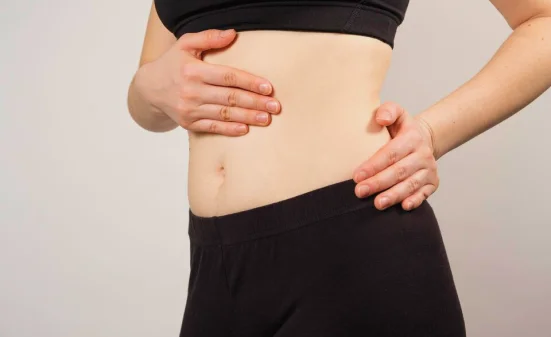
Injury recovery may be delayed if the Spleen cannot produce sufficient qi and blood, often due to inadequate dietary or lifestyle habits. The Spleen is responsible for the upward movement of qi, making its assessment crucial in cases like foot over-pronation, where there is a collapse of the foot’s medial arch. Similarly, in upper crossed syndrome, where there is an exaggerated kyphotic curve in the thoracic spine leading to mid-body collapse, symptoms often correlate with a Spleen qi deficiency.
Furthermore, if muscle tone appears suboptimal or a muscle strain is not healing effectively, evaluating the Spleen’s function is essential due to its key role in sustaining muscle tissue.
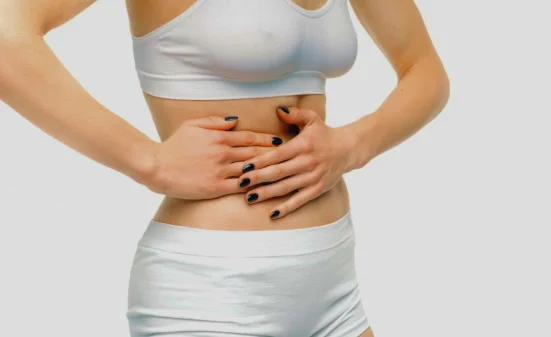
Liver in TCM theory
The traditional role of the Liver is to store blood, ensuring the smooth circulation of qi and blood throughout the body, as well as general movement and coordination. It governs the sinews, which in Traditional Chinese Medicine (TCM) refers not only to what biomedicine identifies as tendons but also to a certain ropiness observable in specific muscle tissues, such as the upper trapezius.
In terms of musculoskeletal health, Liver Qi is directed upwards and outwards, positioning the Liver as crucial for delivering qi and blood to the limbs and orchestrating all movement and physical activity.
Physical activity relies on Liver Blood to moisten and nourish the body’s tissues, facilitating smooth movements and reducing the risk of injuries. When Liver Blood fails to provide adequate moisture, issues such as tendinopathies, limb numbness, paresthesia, and difficulties in bending or stretching can arise. Although traditional texts do not explicitly mention a nervous system, symptoms like spasms and contractures direct attention towards the Liver, which is often associated with conditions that affect the muscular and nervous systems, such as multiple sclerosis, post-stroke hemiplegia, and tremors. The Liver is viewed as fulfilling a role similar to that of the nervous system in motor control, essential for maintaining coordination and evenness in body movements.
Heart and Pericardium in TCM theory
- Store the Jing
- Govern growth, development and maturation
- Regulate both the fire and water of the body
- Dominate the spine and the residence of the low back
- Rule the bones, joints and ligaments
- Impact on Musculoskeletal health

A reduction in the warming capability of Kidney yang qi results in diminished circulation of protective qi, which in turn can lead to painful obstruction syndrome. Joint pain necessitates an evaluation of the Kidneys due to their connection to bone health and influence over ligaments. The Kidneys regulate body fluids, specifically “ye” fluids like synovial fluids, which are crucial for lubricating joints and nourishing ligaments.
As Kidney energy wanes, typical degenerative changes in the spine take place, increasing the vulnerability of aging athletes to injuries.
Benefits of Orthopedic and Sports Acupuncture in Clifton, NJ
List of orthopedic and sports acupuncture benefits:
- Faster recovery from injury
- Promotes bone and fracture healing
- Resolves muscle spasms and muscle strains.
- Prevent recurring injuries.
- Treats cramps, strain and contusion
- Reduces inflammation
- Improves range of motion
- Clears obstructions
- Manages bruising and swelling
- Regain flexibility
- Aids in rehabilitation

Orthopedic and Sports Acupuncture in Clifton, NJ

At Pulse Acupuncture, we recommend starting treatment 2-3 times per week. As your pain subsides and your strength improves, the frequency can gradually be reduced to once a week and eventually once every 10 days. Acute injuries generally heal faster than chronic ones. For recurring issues, especially those linked to work or sports activities, periodic maintenance sessions may be necessary to keep you feeling your best.
Well-functioning organs generate vital primary substances that build a robust musculoskeletal system. Factors contributing to the production of these healthy substances include regular exercise, a nutritious diet, favorable genetics, effective stress management, fulfilling employment, a supportive social and emotional network, and a well-rounded mental, emotional, and spiritual life.
Acupuncture Sports medicine at Pulse Acupuncture in Clifton applies therapeutic modalities that are complementary to acupuncture for sports injuries. Such modalities include, moxibustion, chinese herbal medicine, TDP lamps, cupping, electro-acupuncture, bleeding cupping, and gua-sha technique.
At the acupuncture center, Marina Doktorman will choose a specific treatment protocol, potentially including neuro-acupuncture Clifton and point prescription that satisfies the treatment principles and comprehensively addresses the patient and their injury. The information gleaned from the integrated TCM and sports medicine assessment provides many options for treatment and selecting the most effective acupuncture points. The points chosen are complementary and synergistic based on the principles of both TCM and sports medicine.
About the Practitioner
Marina Doktorman was born in Ukraine and immigrated to United States at the age of 15. She received her B.A. degree in Psychology from Long Island University, Brooklyn, NY in 1997. Marina Doktorman, L.Ac, Dipl.Ac., is a nationally board certified acupuncturist since 2001 and licensed in NY and NJ states. She first worked in NYC in a multi-specialty clinic before establishing her private practice in 2005, in Clifton, NJ.
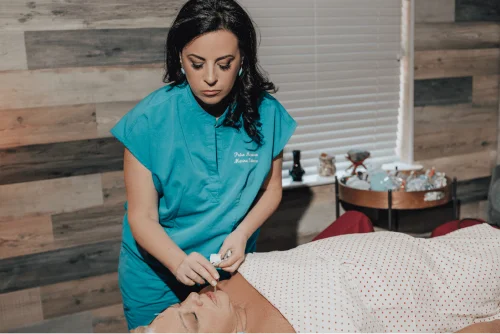
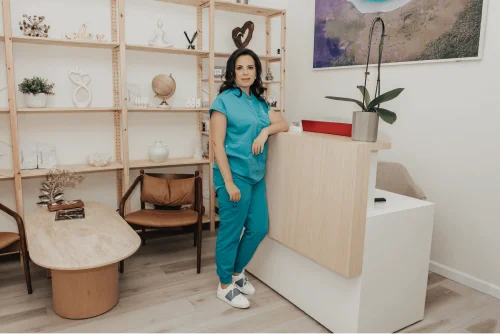
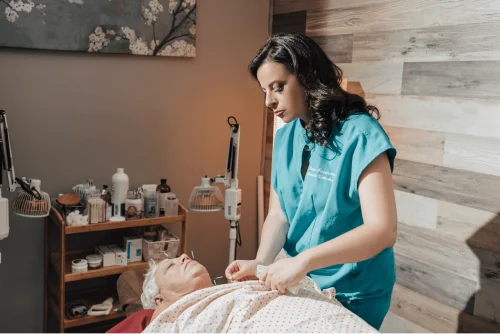
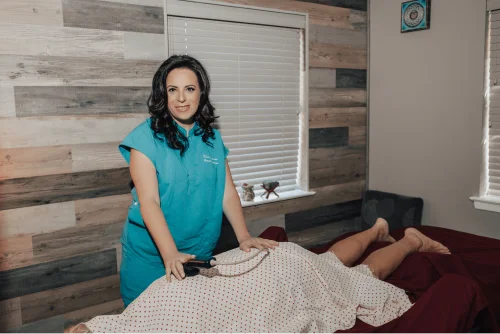
Other Services
Pulse Acupuncture Prices
$145
$125
$90
$75
$75
$125
$200
$60
$85
$150
Cosmetic Acupuncture
$250
$200
We accept:



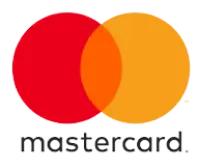
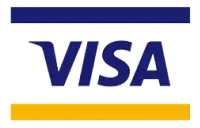
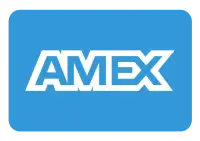


If cancellations are less than 24 hours, we will charge 50 % of our regular fees. If no shows- full appointment charge
Orthopedic and Sports Acupuncture Testimonials in Clifton
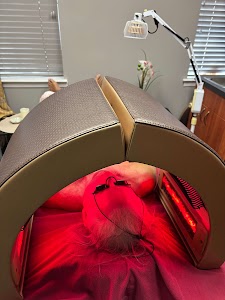
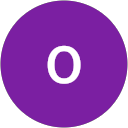
Dr. Marina takes the time to listen deeply and tailors each acupuncture session to what my body needs most. Not only have my blood sugar levels improved, but my headaches are far less frequent, and both my back and shoulder pain have significantly decreased. I feel more mobile, balanced, and energized after every visit.
Her calm, welcoming presence and deep expertise make every session feel like a reset — physically and mentally. The clinic space is peaceful, and she creates an environment that supports real healing.
If you’re struggling with chronic health issues and looking for someone who truly understands how to help, I can’t recommend Dr. Marina enough. She’s exceptional.

Dr. Marina takes the time to listen deeply and tailors each acupuncture session to what my body needs most. Not only have my blood sugar levels improved, but my headaches are far less frequent, and both my back and shoulder pain have significantly decreased. I feel more mobile, balanced, and energized after every visit.
Her calm, welcoming presence and deep expertise make every session feel like a reset — physically and mentally. The clinic space is peaceful, and she creates an environment that supports real healing.
If you’re struggling with chronic health issues and looking for someone who truly understands how to help, I can’t recommend Dr. Marina enough. She’s exceptional.

Dr. Marina takes the time to listen deeply and tailors each acupuncture session to what my body needs most. Not only have my blood sugar levels improved, but my headaches are far less frequent, and both my back and shoulder pain have significantly decreased. I feel more mobile, balanced, and energized after every visit.
Her calm, welcoming presence and deep expertise make every session feel like a reset — physically and mentally. The clinic space is peaceful, and she creates an environment that supports real healing.
If you’re struggling with chronic health issues and looking for someone who truly understands how to help, I can’t recommend Dr. Marina enough. She’s exceptional.

Dr. Marina takes the time to listen deeply and tailors each acupuncture session to what my body needs most. Not only have my blood sugar levels improved, but my headaches are far less frequent, and both my back and shoulder pain have significantly decreased. I feel more mobile, balanced, and energized after every visit.
Her calm, welcoming presence and deep expertise make every session feel like a reset — physically and mentally. The clinic space is peaceful, and she creates an environment that supports real healing.
If you’re struggling with chronic health issues and looking for someone who truly understands how to help, I can’t recommend Dr. Marina enough. She’s exceptional.

Dr. Marina takes the time to listen deeply and tailors each acupuncture session to what my body needs most. Not only have my blood sugar levels improved, but my headaches are far less frequent, and both my back and shoulder pain have significantly decreased. I feel more mobile, balanced, and energized after every visit.
Her calm, welcoming presence and deep expertise make every session feel like a reset — physically and mentally. The clinic space is peaceful, and she creates an environment that supports real healing.
If you’re struggling with chronic health issues and looking for someone who truly understands how to help, I can’t recommend Dr. Marina enough. She’s exceptional.
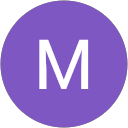









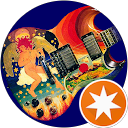









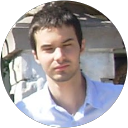
I hope this message finds you well! I am writing to express my deepest gratitude for the incredible impact your acupuncture sessions have had on my life. Your expertise and care have helped me find relief and healing in ways I never thought possible.
When I first sought acupuncture, I was struggling with a combination of issues that affected my overall well-being. Chronic back pain was causing constant discomfort, and my restless nights were dominated by persistent night sweats. Additionally, I was battling frustrating skin issues that seemed to resist all other forms of treatment.
From the very first session, I knew I was in good hands. Your thorough understanding of my concerns and willingness to explain the acupuncture process put me at ease. The ambiance of your clinic created a serene and comforting space, setting the tone for a transformative healing journey.
What amazed me most was the efficacy of acupuncture in addressing my various health challenges. The impact on my sleep was nothing short of miraculous. After a few sessions, I began experiencing deep, uninterrupted sleep, waking up refreshed and energized—a change I had been longing for, but never found through other methods.
Furthermore, the improvement in my skin condition was remarkable. Acupuncture seemed to trigger a healing response, and gradually, my skin issues started to fade away. I couldn't believe the visible transformation, and it did wonders for my self-confidence.
As for the night sweats and back pain, they became less frequent and intense with each session. Your targeted approach and skillful needle placement directly addressed the root causes of my discomfort, providing much-needed relief and easing the burdens I had carried for far too long.
I cannot stress enough how appreciative I am for the positive impact you've had on my life. Your dedication to helping your patients achieve better health and well-being is truly commendable. I wholeheartedly recommend your services to anyone seeking holistic and effective solutions to their health issues.
Once again, thank you for your expertise, kindness, and genuine care. You have not only been my acupuncturist but also a catalyst for transformative change in my life. I am forever grateful for the healing journey we embarked on together.
Thank you Dr. Marina Doktorman! Special shoutout to Olga for being so welcoming!

I hope this message finds you well! I am writing to express my deepest gratitude for the incredible impact your acupuncture sessions have had on my life. Your expertise and care have helped me find relief and healing in ways I never thought possible.
When I first sought acupuncture, I was struggling with a combination of issues that affected my overall well-being. Chronic back pain was causing constant discomfort, and my restless nights were dominated by persistent night sweats. Additionally, I was battling frustrating skin issues that seemed to resist all other forms of treatment.
From the very first session, I knew I was in good hands. Your thorough understanding of my concerns and willingness to explain the acupuncture process put me at ease. The ambiance of your clinic created a serene and comforting space, setting the tone for a transformative healing journey.
What amazed me most was the efficacy of acupuncture in addressing my various health challenges. The impact on my sleep was nothing short of miraculous. After a few sessions, I began experiencing deep, uninterrupted sleep, waking up refreshed and energized—a change I had been longing for, but never found through other methods.
Furthermore, the improvement in my skin condition was remarkable. Acupuncture seemed to trigger a healing response, and gradually, my skin issues started to fade away. I couldn't believe the visible transformation, and it did wonders for my self-confidence.
As for the night sweats and back pain, they became less frequent and intense with each session. Your targeted approach and skillful needle placement directly addressed the root causes of my discomfort, providing much-needed relief and easing the burdens I had carried for far too long.
I cannot stress enough how appreciative I am for the positive impact you've had on my life. Your dedication to helping your patients achieve better health and well-being is truly commendable. I wholeheartedly recommend your services to anyone seeking holistic and effective solutions to their health issues.
Once again, thank you for your expertise, kindness, and genuine care. You have not only been my acupuncturist but also a catalyst for transformative change in my life. I am forever grateful for the healing journey we embarked on together.
Thank you Dr. Marina Doktorman! Special shoutout to Olga for being so welcoming!

I hope this message finds you well! I am writing to express my deepest gratitude for the incredible impact your acupuncture sessions have had on my life. Your expertise and care have helped me find relief and healing in ways I never thought possible.
When I first sought acupuncture, I was struggling with a combination of issues that affected my overall well-being. Chronic back pain was causing constant discomfort, and my restless nights were dominated by persistent night sweats. Additionally, I was battling frustrating skin issues that seemed to resist all other forms of treatment.
From the very first session, I knew I was in good hands. Your thorough understanding of my concerns and willingness to explain the acupuncture process put me at ease. The ambiance of your clinic created a serene and comforting space, setting the tone for a transformative healing journey.
What amazed me most was the efficacy of acupuncture in addressing my various health challenges. The impact on my sleep was nothing short of miraculous. After a few sessions, I began experiencing deep, uninterrupted sleep, waking up refreshed and energized—a change I had been longing for, but never found through other methods.
Furthermore, the improvement in my skin condition was remarkable. Acupuncture seemed to trigger a healing response, and gradually, my skin issues started to fade away. I couldn't believe the visible transformation, and it did wonders for my self-confidence.
As for the night sweats and back pain, they became less frequent and intense with each session. Your targeted approach and skillful needle placement directly addressed the root causes of my discomfort, providing much-needed relief and easing the burdens I had carried for far too long.
I cannot stress enough how appreciative I am for the positive impact you've had on my life. Your dedication to helping your patients achieve better health and well-being is truly commendable. I wholeheartedly recommend your services to anyone seeking holistic and effective solutions to their health issues.
Once again, thank you for your expertise, kindness, and genuine care. You have not only been my acupuncturist but also a catalyst for transformative change in my life. I am forever grateful for the healing journey we embarked on together.
Thank you Dr. Marina Doktorman! Special shoutout to Olga for being so welcoming!

I hope this message finds you well! I am writing to express my deepest gratitude for the incredible impact your acupuncture sessions have had on my life. Your expertise and care have helped me find relief and healing in ways I never thought possible.
When I first sought acupuncture, I was struggling with a combination of issues that affected my overall well-being. Chronic back pain was causing constant discomfort, and my restless nights were dominated by persistent night sweats. Additionally, I was battling frustrating skin issues that seemed to resist all other forms of treatment.
From the very first session, I knew I was in good hands. Your thorough understanding of my concerns and willingness to explain the acupuncture process put me at ease. The ambiance of your clinic created a serene and comforting space, setting the tone for a transformative healing journey.
What amazed me most was the efficacy of acupuncture in addressing my various health challenges. The impact on my sleep was nothing short of miraculous. After a few sessions, I began experiencing deep, uninterrupted sleep, waking up refreshed and energized—a change I had been longing for, but never found through other methods.
Furthermore, the improvement in my skin condition was remarkable. Acupuncture seemed to trigger a healing response, and gradually, my skin issues started to fade away. I couldn't believe the visible transformation, and it did wonders for my self-confidence.
As for the night sweats and back pain, they became less frequent and intense with each session. Your targeted approach and skillful needle placement directly addressed the root causes of my discomfort, providing much-needed relief and easing the burdens I had carried for far too long.
I cannot stress enough how appreciative I am for the positive impact you've had on my life. Your dedication to helping your patients achieve better health and well-being is truly commendable. I wholeheartedly recommend your services to anyone seeking holistic and effective solutions to their health issues.
Once again, thank you for your expertise, kindness, and genuine care. You have not only been my acupuncturist but also a catalyst for transformative change in my life. I am forever grateful for the healing journey we embarked on together.
Thank you Dr. Marina Doktorman! Special shoutout to Olga for being so welcoming!

I hope this message finds you well! I am writing to express my deepest gratitude for the incredible impact your acupuncture sessions have had on my life. Your expertise and care have helped me find relief and healing in ways I never thought possible.
When I first sought acupuncture, I was struggling with a combination of issues that affected my overall well-being. Chronic back pain was causing constant discomfort, and my restless nights were dominated by persistent night sweats. Additionally, I was battling frustrating skin issues that seemed to resist all other forms of treatment.
From the very first session, I knew I was in good hands. Your thorough understanding of my concerns and willingness to explain the acupuncture process put me at ease. The ambiance of your clinic created a serene and comforting space, setting the tone for a transformative healing journey.
What amazed me most was the efficacy of acupuncture in addressing my various health challenges. The impact on my sleep was nothing short of miraculous. After a few sessions, I began experiencing deep, uninterrupted sleep, waking up refreshed and energized—a change I had been longing for, but never found through other methods.
Furthermore, the improvement in my skin condition was remarkable. Acupuncture seemed to trigger a healing response, and gradually, my skin issues started to fade away. I couldn't believe the visible transformation, and it did wonders for my self-confidence.
As for the night sweats and back pain, they became less frequent and intense with each session. Your targeted approach and skillful needle placement directly addressed the root causes of my discomfort, providing much-needed relief and easing the burdens I had carried for far too long.
I cannot stress enough how appreciative I am for the positive impact you've had on my life. Your dedication to helping your patients achieve better health and well-being is truly commendable. I wholeheartedly recommend your services to anyone seeking holistic and effective solutions to their health issues.
Once again, thank you for your expertise, kindness, and genuine care. You have not only been my acupuncturist but also a catalyst for transformative change in my life. I am forever grateful for the healing journey we embarked on together.
Thank you Dr. Marina Doktorman! Special shoutout to Olga for being so welcoming!
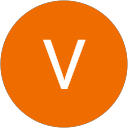




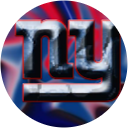




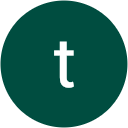




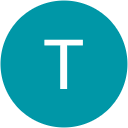









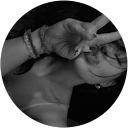
Marina's skills in acupuncture are exceptional. She genuinely listens to your concerns and customizes the sessions to address your specific needs. Her gentle and precise technique ensures a comfortable experience, and the results are remarkable. I felt the positive effects almost instantly, and I have been regularly visiting to maintain my overall health.
The team at Pulse Acupuncture are professional, friendly, and create a welcoming atmosphere. From the moment I stepped in, I was greeted with a warm smile and made to feel right at home. They are knowledgeable and always ready to answer any questions I have. The office itself is a peaceful and serene space, which adds to the overall relaxation and healing experience.
I can't recommend Pulse Acupuncture enough. Marina's expertise, combined with the welcoming and caring staff, guarantees an outstanding experience. I am truly grateful for the positive impact Marina has had on my health, and I will continue to have regular sessions to maintain my well-being. Thank you, Pulse Acupuncture, for providing such exceptional service!

Marina's skills in acupuncture are exceptional. She genuinely listens to your concerns and customizes the sessions to address your specific needs. Her gentle and precise technique ensures a comfortable experience, and the results are remarkable. I felt the positive effects almost instantly, and I have been regularly visiting to maintain my overall health.
The team at Pulse Acupuncture are professional, friendly, and create a welcoming atmosphere. From the moment I stepped in, I was greeted with a warm smile and made to feel right at home. They are knowledgeable and always ready to answer any questions I have. The office itself is a peaceful and serene space, which adds to the overall relaxation and healing experience.
I can't recommend Pulse Acupuncture enough. Marina's expertise, combined with the welcoming and caring staff, guarantees an outstanding experience. I am truly grateful for the positive impact Marina has had on my health, and I will continue to have regular sessions to maintain my well-being. Thank you, Pulse Acupuncture, for providing such exceptional service!

Marina's skills in acupuncture are exceptional. She genuinely listens to your concerns and customizes the sessions to address your specific needs. Her gentle and precise technique ensures a comfortable experience, and the results are remarkable. I felt the positive effects almost instantly, and I have been regularly visiting to maintain my overall health.
The team at Pulse Acupuncture are professional, friendly, and create a welcoming atmosphere. From the moment I stepped in, I was greeted with a warm smile and made to feel right at home. They are knowledgeable and always ready to answer any questions I have. The office itself is a peaceful and serene space, which adds to the overall relaxation and healing experience.
I can't recommend Pulse Acupuncture enough. Marina's expertise, combined with the welcoming and caring staff, guarantees an outstanding experience. I am truly grateful for the positive impact Marina has had on my health, and I will continue to have regular sessions to maintain my well-being. Thank you, Pulse Acupuncture, for providing such exceptional service!

Marina's skills in acupuncture are exceptional. She genuinely listens to your concerns and customizes the sessions to address your specific needs. Her gentle and precise technique ensures a comfortable experience, and the results are remarkable. I felt the positive effects almost instantly, and I have been regularly visiting to maintain my overall health.
The team at Pulse Acupuncture are professional, friendly, and create a welcoming atmosphere. From the moment I stepped in, I was greeted with a warm smile and made to feel right at home. They are knowledgeable and always ready to answer any questions I have. The office itself is a peaceful and serene space, which adds to the overall relaxation and healing experience.
I can't recommend Pulse Acupuncture enough. Marina's expertise, combined with the welcoming and caring staff, guarantees an outstanding experience. I am truly grateful for the positive impact Marina has had on my health, and I will continue to have regular sessions to maintain my well-being. Thank you, Pulse Acupuncture, for providing such exceptional service!

Marina's skills in acupuncture are exceptional. She genuinely listens to your concerns and customizes the sessions to address your specific needs. Her gentle and precise technique ensures a comfortable experience, and the results are remarkable. I felt the positive effects almost instantly, and I have been regularly visiting to maintain my overall health.
The team at Pulse Acupuncture are professional, friendly, and create a welcoming atmosphere. From the moment I stepped in, I was greeted with a warm smile and made to feel right at home. They are knowledgeable and always ready to answer any questions I have. The office itself is a peaceful and serene space, which adds to the overall relaxation and healing experience.
I can't recommend Pulse Acupuncture enough. Marina's expertise, combined with the welcoming and caring staff, guarantees an outstanding experience. I am truly grateful for the positive impact Marina has had on my health, and I will continue to have regular sessions to maintain my well-being. Thank you, Pulse Acupuncture, for providing such exceptional service!
Dr Marina makes me feel so relaxed and my pain is gone.
My knees, my back thank her too.
I can live with no meds
Dr Marina makes me feel so relaxed and my pain is gone.
My knees, my back thank her too.
I can live with no meds
Dr Marina makes me feel so relaxed and my pain is gone.
My knees, my back thank her too.
I can live with no meds
Dr Marina makes me feel so relaxed and my pain is gone.
My knees, my back thank her too.
I can live with no meds
Dr Marina makes me feel so relaxed and my pain is gone.
My knees, my back thank her too.
I can live with no meds
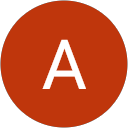




The acupuncture has helped with my acid reflux. She also does the hot rocks and cupping that has helped me immensely.
The acupuncture has helped with my acid reflux. She also does the hot rocks and cupping that has helped me immensely.
The acupuncture has helped with my acid reflux. She also does the hot rocks and cupping that has helped me immensely.
The acupuncture has helped with my acid reflux. She also does the hot rocks and cupping that has helped me immensely.
The acupuncture has helped with my acid reflux. She also does the hot rocks and cupping that has helped me immensely.
I have tried other acupuncturist before but no one measured to Marina.
She got me through back and neck unbearable pain and forever I’m grateful.
I do recommend everyone to go and see for themselves how amazing her techniques.
I have tried other acupuncturist before but no one measured to Marina.
She got me through back and neck unbearable pain and forever I’m grateful.
I do recommend everyone to go and see for themselves how amazing her techniques.
I have tried other acupuncturist before but no one measured to Marina.
She got me through back and neck unbearable pain and forever I’m grateful.
I do recommend everyone to go and see for themselves how amazing her techniques.
I have tried other acupuncturist before but no one measured to Marina.
She got me through back and neck unbearable pain and forever I’m grateful.
I do recommend everyone to go and see for themselves how amazing her techniques.
I have tried other acupuncturist before but no one measured to Marina.
She got me through back and neck unbearable pain and forever I’m grateful.
I do recommend everyone to go and see for themselves how amazing her techniques.
Orthopedic & Sports Acupuncture in Clifton, NJ - FAQ
What types of conditions can be treated with Acupuncture Sports Medicine?
Are there any side effects associated with Orthopedic and Sports Acupuncture?
Are Orthopedic & Sports Acupuncture covered by insurance?
Contact Us
Call or text
We are waiting your email
1030 Clifton Ave, suite 104 Clifton, NJ 07013
